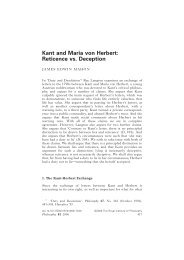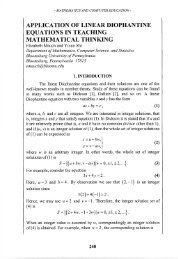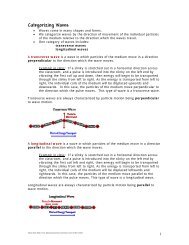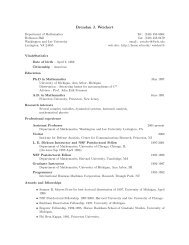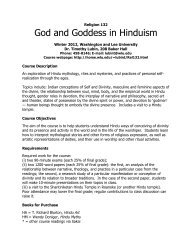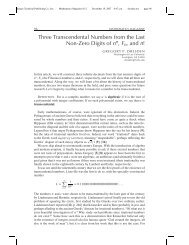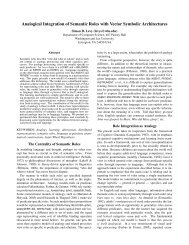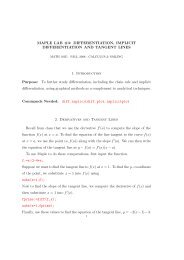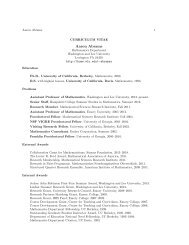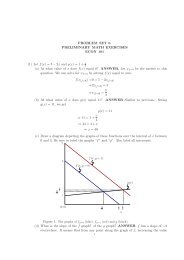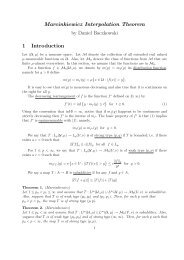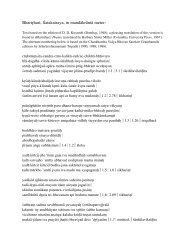comparative assessment of decentralization in africa: ethiopia desk ...
comparative assessment of decentralization in africa: ethiopia desk ...
comparative assessment of decentralization in africa: ethiopia desk ...
- No tags were found...
You also want an ePaper? Increase the reach of your titles
YUMPU automatically turns print PDFs into web optimized ePapers that Google loves.
powers <strong>of</strong> state legislatures found <strong>in</strong> certa<strong>in</strong> other federations, <strong>in</strong>clud<strong>in</strong>g the ability to selectrepresentatives for the House <strong>of</strong> Federation, the upper chamber <strong>of</strong> the parliament that has some<strong>in</strong>fluence on patterns <strong>of</strong> fiscal <strong>decentralization</strong>. Woreda councils are assemblies that meet onceevery three months. The council has the authority <strong>of</strong> approv<strong>in</strong>g the woreda’s budget, and <strong>of</strong>review<strong>in</strong>g the work progress <strong>of</strong> the different sectors and executive members. The judicial systemis represented by the court and the executive branch is represented by the states and woredaadm<strong>in</strong>istrations.Deconcentration and delegation are perhaps less prom<strong>in</strong>ent <strong>in</strong> Ethiopia than <strong>in</strong> many Africancountries or cases <strong>of</strong> <strong>decentralization</strong> elsewhere <strong>in</strong> the develop<strong>in</strong>g world. Nonetheless,deconcentration may be seen <strong>in</strong> the zones (with the regional states—not the centralgovernment—do<strong>in</strong>g the ―deconcentrat<strong>in</strong>g‖). The roles <strong>of</strong> the zones vary from state to state—withsome work<strong>in</strong>g on a deconcentrated approach where the regions confer specified responsibilitiesto the zones, and others work<strong>in</strong>g on a more bottom-up approach—but <strong>in</strong> each case they arepartially responsible for implement<strong>in</strong>g regional <strong>in</strong>itiatives.The relatively limited nature <strong>of</strong> deconcentration <strong>in</strong> Ethiopia is especially noteworthy <strong>in</strong> onesignificant area where SNGs have greater autonomy than most <strong>of</strong> their African counterparts:control over the civil service. While Watson and Yohannes (2005, p. 15) note that ―the civilservice is a federal <strong>in</strong>stitution,‖ it seems clear that civil servants employed by SNGs actuallyrespond to subnational units <strong>of</strong> government, not directly to national government. As noted byFessha and Kirkby (2008, p. 259), Ethiopia’s regions have a separate civil service from thenational civil service. This enables the regions to hire and fire personnel, <strong>in</strong>clud<strong>in</strong>g the largenumber <strong>of</strong> teachers each has under their purview. The full transfer <strong>of</strong> autonomy over personnelwas crucial for the substantial ―big push‖ fiscal <strong>decentralization</strong> that occurred <strong>in</strong> Ethiopia, asmany other countries decentralize expenditures, yet reta<strong>in</strong> centralized patterns <strong>of</strong> control overnationally contracted civil servants.2.2 AUTONOMYSubnational autonomy can be judged by look<strong>in</strong>g at political autonomy, fiscal autonomy, andadm<strong>in</strong>istrative autonomy. We beg<strong>in</strong> with political autonomy. As the section on authority abovewould suggest, political power <strong>in</strong> Ethiopia is more decentralized than <strong>in</strong> most African countries.The lower chamber <strong>of</strong> the national parliament (the highest political organ), does not <strong>in</strong>volveitself <strong>in</strong> regional and local affairs. The parliament is limited to legislat<strong>in</strong>g laws <strong>of</strong> nationalimportance and oversee<strong>in</strong>g the national executives and national departments. Regional <strong>of</strong>ficialsare not expected to report to the national parliament. The HF, on the other hand, is established toaddress nationality issues. With its members from nations and nationalities, it can be regarded asa ―council <strong>of</strong> nationalities‖, and is composed <strong>of</strong> representatives <strong>of</strong> all ethnic groups. The HF hasa mandate to determ<strong>in</strong>e the allocation <strong>of</strong> <strong>in</strong>tergovernmental transfer to different regions, withoutthe <strong>in</strong>volvement <strong>of</strong> regional governments (though regional governments are consulted forpurposes <strong>of</strong> <strong>in</strong>formation). The allocation formula is ultimately approved by members <strong>of</strong> the HF.As <strong>in</strong>dicated above, regional governments have fiscal authority, but the degree to which regionalgovernments (and woredas) have fiscal autonomy is more circumscribed. The dist<strong>in</strong>ction herecomes down to the sources <strong>of</strong> subnational revenues, and particularly that between<strong>in</strong>tergovernmental transfers and own-source revenues that SNGs collect on their own tax bases.Fiscal <strong>decentralization</strong> <strong>in</strong> Ethiopia is substantial by African standards, if one takes <strong>in</strong>to accountETHIOPIA DESK STUDY 11



